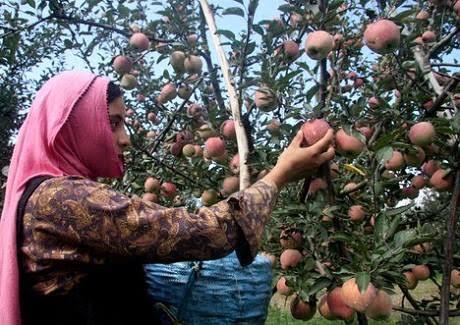
Apples, Algebraand A Mecca Dream: Kashmiri Girl's 19-Hour Hope Run
Representational Photo
By Gowher Bhat
The first call of the day is the rooster that Nazia Khan refuses to silence.
By 4 am, she is already in the barn, fingers testing the udder of her lone cow. Milk hits the steel pail in an even stream.
ADVERTISEMENTShe measures two litres for customers, keeps half a litre for her parents' tea, and is back in the kitchen before the first kettle whistles.
At 22, Nazia is the oldest worker in her house and the youngest postgraduate student in her village. She is also the only child her parents have left who can still walk without a cane.
Her father, Abdul Rashid Khan, once drove a truck over the Sinthan Pass. Two slipped discs ended that life. Now, he shuffles to the veranda with a walker Nazia built from discarded orchard wood. Her mother, Raja Begum, survives on tablets that cost 1,200 rupees a week.
Both parents sit in the sun and watch their daughter load vegetable baskets onto her head, the same way other parents watch sons leave for green pastures.
The walk to the market takes 27 minutes downhill. Nazia counts every step because the return climb will be done with 40 kilos less produce and 400 rupees more hope.
She sets up beside the bus stand where commuters from Anantnag buy breakfast radish and gossip. A plastic sheet becomes her shop, while a broken brick becomes her chair.
By seven-thirty, the spinach is sold, by eight the milk is gone, and by eight-fifteen she's counting how much homework she can finish before lunch.
Customers do not haggle. They know the girl with soil under her nails is paying school fees for her 15-year-old brother, Aamir, who still dreams of becoming a pilot.
“She charges the same rate for three years,” says Farooq Hakeem, the government teacher who buys 200 millilitres every day and refuses change.“In Kashmir, that counts as a miracle.”
The miracle shows up in numbers.
Nazia keeps a small notebook where every rupee has a place. Last month her stall made 11,400 rupees, and the cow brought in another 3,600.
She spent 4,800 on medicines, 1,500 on Aamir's school uniform, and 650 on her bus fare to the University of Kashmir's south campus.
What's left, around 7,000, goes into a tin box marked“Hajj ticket.”
She hopes to take her parents for umrah because she has heard that Saudi hospitals can treat nerve problems that doctors in Srinagar have stopped trying to solve.
Afternoons belong to the land that once grew only maize.
Nazia planted her first apple sapling at 18 after learning from YouTube videos at a neighbour's house. Today she has 210 trees spread across two terraced acres. She knows each variety the way others remember old classmates: Red Delicious, American Trel, Maharaji.
She can explain high-density spacing and soil pH in the same breath. The extension officer began taking her seriously the day she arrived with a soil-test receipt she had paid for herself.
Between pruning and weeding, she attends her classes on the phone. Sociology feels familiar when the professor talks about family and home. She writes her assignments on fertiliser sacks turned inside out.
She scored 76 percent in her first semester, higher than anyone who sits in the classroom.
Evening brings cattle feed, dinner prep, and the moment she waits for: parents resting, her brother studying, and the stove cooling.
Around 11 pm, she opens a second-hand book that feels heavier than her day and lighter than her worries.
Under a one-watt LED bulb, she reads about Max Weber and wonders if the sociologist ever milked a cow.
The village has taken notice.
Two girls asked to work at her stall for a daily wage of 50 rupees. She insisted on paying them 70 and added free breakfast.
A widowed neighbour now sells mushrooms grown on walnut logs because Nazia lent her 6,000 rupees without charging interest.
A shopkeeper across the road says she is building a cooperative without even knowing the word.
But this winter is likely to challenge her.
Apple prices fell sharply last year. A 16-kilo box sold for 450 rupees, down from 800 the previous season. A local chemist says her mother's new medicines will add another 600 rupees to the monthly bill.

Legal Disclaimer:
MENAFN provides the
information “as is” without warranty of any kind. We do not accept
any responsibility or liability for the accuracy, content, images,
videos, licenses, completeness, legality, or reliability of the information
contained in this article. If you have any complaints or copyright
issues related to this article, kindly contact the provider above.


















Comments
No comment